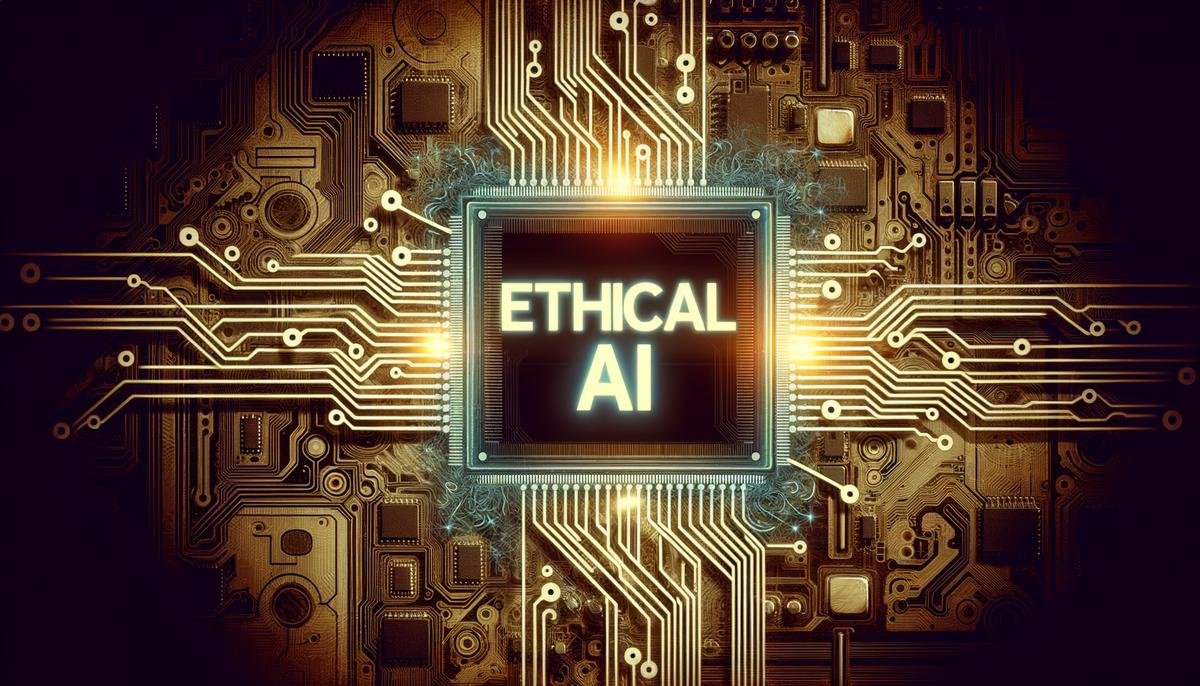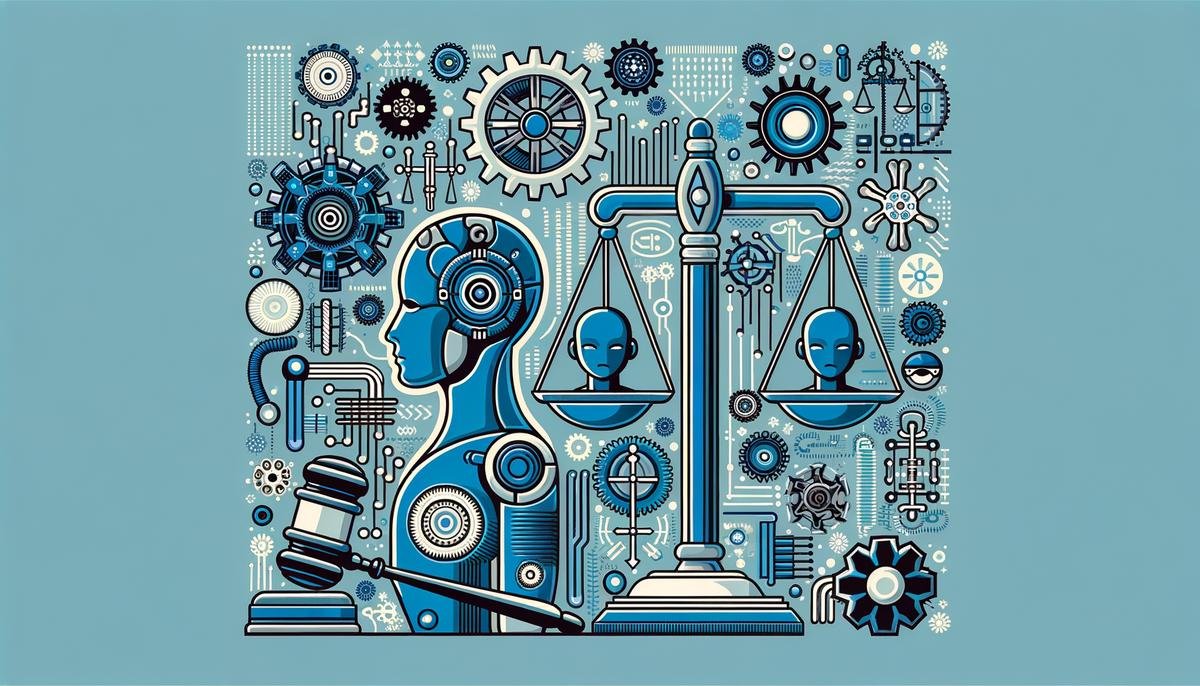As we stand on the brink of a new era shaped by artificial intelligence (AI), the questions of how it will influence our society, ethics, and daily lives become more pressing. The Partnership on AI emerges as a beacon of hope, aiming to guide AI development in harmony with human values and ethical standards. This article explores the mission and core objectives of this partnership, shedding light on its commitment to fostering AI technologies that benefit humanity as a whole.
Understanding the Partnership on AI
The Partnership on AI: Understanding Its Mission and Core Objectives
The world we live in today is increasingly intertwined with the field of artificial intelligence (AI). As AI technologies evolve rapidly, questions about their impact on society, ethics, and the future of human work become more pressing. It’s against this backdrop that the Partnership on AI was founded. This group came together with a tall order: ensuring that AI technologies are rolled out in a way that respects human values, upholds ethical standards, and contributes positively to the well-being of people everywhere.
So, who exactly started this partnership and what do they aim to do? Well, the Partnership on AI is somewhat of a gathering of giants – from big tech companies like Google and Microsoft to smaller, specialized research organizations and groups interested in civil society and social good. This union was not born out of convenience but necessity. As it turns out, AI is not just tricky to build but equally challenging to apply without unintended consequences.
One of the central missions of the Partnership on AI is to make sure that as AI technologies are being developed, there’s a common understanding and practice of transparency. This means making it easier for people to understand how AI systems make decisions, who is affected by these decisions, and how any possible issues or biases are being addressed. It’s a bit like saying, “Sure, this AI system does X, but here’s how it does it, and here’s how we’re making sure it’s fair.”
Ethical considerations also sit right at the heart of the Partnership’s objectives. In essence, they’re keen on navigating the moral maze that comes with AI development. For instance, if an AI system is designed to screen job applications, the partnership wants to ensure that the system does not unfairly disregard applicants based on gender, age, or ethnicity. It’s all about asking the tough questions upfront to avoid tougher problems down the line.
Additionally, the Partnership on AI champions social benefits. They hold a strong belief that AI should serve the greater good, pushing technology in directions that alleviate rather than exacerbate societal issues. This might mean prioritizing AI research that can help tackle climate change, improve health outcomes, or enhance education techniques.
At its core, this partnership embodies a collaborative spirit. It’s about leading tech firms sitting at the same table with academia, non-profits, and even regulatory bodies to talk about the future of AI. They’re not just discussing what AI can do but focusing on what it should do. The idea is that by bringing diverse perspectives together, more balanced, thoughtful, and ultimately beneficial AI practices can emerge.
The motivator behind this massive group effort can be summed up pretty straightforwardly – to shape an AI future that we can all live with comfortably. The Partnership on AI envisions a world where AI systems don’t just function efficiently but also ethically and beneficially, within social norms and for the broad welfare of humanity.
Getting there is no small feat, certainly. It calls for continuous dialogue, lots of brainstorming, and, importantly, an openness to learning and adapting. Yet, given the caliber of minds and organizations involved, there’s a steady – if cautious – optimism about making meaningful progress toward responsible and beneficial AI.

Principles of Ethical AI
When talking about guiding AI development with an ethical compass, privacy bubbles up as a top concern. With AI technologies sneaking into our daily lives, from smartphones to smart home devices, the massive amounts of data being churned broadens the privacy debate. Sticking true to the idea of building trusty AI, it’s crucial to ensure that individuals’ personal information is handled with the utmost respect and care. This means being upfront about what data is collected, how it’s used, and giving people the power to have a say in this process. The thought here is simple: as AI technologies learn from data, the safeguard of this information honors the privacy and dignity of individuals everywhere.
- Switching gears, accountability stands as another pillar in the ethical framework of AI development. This principle throws light on the essence of having a clear system of responsibility for AI’s actions and decisions. In concrete terms, if an AI system makes a mistake or causes harm, it should be possible to pinpoint where things went wrong. This isn’t just about fixing faults but also about learning from these hiccups to steer future AI advancements in a safer direction. It brings to the fore a culture of humility and correction, where developers and companies are encouraged to own up, rectify, and learn from the missteps in AI applications.
Furthermore, integrating these principles into AI brings to bear a thoughtful consideration of how these technologies intersect with the very fabric of human existence. It gently nudges developers, companies, and policymakers to persistently reflect on how AI molds societies, influences perceptions, and interacts with the common values held by communities across the globe.
This exploration serves as a compass, guiding the voyage of AI development towards an ethical north star. By stringing together fairness, transparency, accountability, and privacy, the aim is to weave a tapestry of AI technologies that enriches human life without overshadowing the human spirit. It’s about penning a future where AI acts as a supportive ally—amplifying human potential rather than dimming it. And while the journey has its fair share of challenges, embracing these principles ensures that every step taken is a stride towards an honourable and equitable digital tomorrow.

Challenges in AI Governance
As we stride further into the realm of artificial intelligence (AI), the path is riddled with ethical dilemmas and regulatory hurdles. Despite efforts to mold AI technologies into forces for societal good, several pressing challenges loom over the ethical governance of these advancements. Each of these challenges presents a complex puzzle, involving a blend of rapidly advancing technology, varied cultural norms, and the arduous task of crafting meaningful regulations that bridge high-minded ethical ideals with the gritty reality of technology implementation.
One of the most glaring challenges in ethically governing AI is the sheer speed at which technology evolves. AI technologies are not static; they grow and change, often at a pace that leaves regulatory frameworks gasping in their wake. This relentless advance can outstrip our capacity to fully comprehend new developments’ potential impacts before they’re already being integrated into daily life. The result is a regulatory scramble, where policy often lags behind practice, creating gaps in which unethical use of AI can flourish unchecked.
Cultural and societal differences further compound the challenge of governing AI ethically. What one culture considers ethical, another might view with skepticism or outright disapproval. For example, some societies might prioritize individual privacy over collective security, while others may hold an opposing stance. These variations make it exceedingly difficult to establish a universal ethical guideline for AI that respects diverse values and norms. Instead, AI governance can end up being a patchwork of localized standards, leaving global coherence and cooperation an ambitious but elusive goal.
Perhaps one of the most daunting tasks is translating abstract ethical principles into concrete, actionable regulatory policies. Ethical concepts such as fairness and respect can be interpreted in myriad ways when applied to different AI scenarios. Considerations span across designing algorithms without bias, ensuring AI decisions can be explained in understandable terms, and carefully weighing automation’s implications on employment and societal roles. Striking a balance where AI technologies are both innovative and governed by a clear, ethical framework calls for a degree of flexibility and creativity not typically associated with regulatory processes.
Furthermore, these hurdles invariably impact various stakeholders in different ways. Policymakers grapple with the need to protect public interest without stifling innovation. Technologists and developers must navigate evolving regulations while also staying true to ethical design principles. And society at large faces adjustments in perceptions and values influenced by AI integration into everyday life, raising questions about human agency, privacy, and equity.
As we confront these challenges, it becomes clear that no single solution will suffice. Ethical governance of AI is an ongoing process that requires continual adaptation, open-mindedness, and collaboration among all stakeholders involved. It’s about asking hard questions and being ready to adjust our approaches as we learn more about the capabilities and impacts of AI technologies. While we may not achieve perfection in ethically governing AI, our collective effort can steer these powerful technologies toward outcomes that enhance rather than diminish our shared human experience.

Case Studies of AI Ethics in Action
Exploring Ethical AI in Action: Diverse Applications and Outcomes
Healthcare Innovations and Ethical AI
In the healthcare sector, AI has been a breakthrough, especially in patient diagnostics and treatment plans. A well-publicized case involved an AI system developed to diagnose diabetic retinopathy in its early stages. The interesting part? It works without the need for a specialized ophthalmologist. This tool adheres closely to ethical AI by being transparent about its diagnostic criteria and maintaining accuracy that matches or exceeds human experts. It emphasized patient data privacy by anonymizing personal details before analysis, ensuring patient confidentiality while allowing for groundbreaking medical progress.
Compliance with ethical guidelines extended beyond diagnostics. An AI-driven program tailored for mental health services offers personalized therapy sessions based on cognitive-behavioral therapy principles, recording interactions securely to respect patient confidentiality. Such use illustrates a commitment to doing social good, reflecting on mental health needs, and providing accessible care without compromising sensitive information.
Binding Ethics to Criminal Justice Systems
The criminal justice system has seen contentious discussions around AI, particularly predictive policing algorithms and bail-setting models. Amid critiques, several precincts have pivoted towards transparent, fair AI systems focusing on ethical implementations. One model in a northeastern U.S. city revised its predictive policing algorithm to exclude variables historically associated with bias, such as race and zip code. Instead, it focuses on recent, specific crime data, integrating ethics by promoting accountability and reassessing the model’s fairness continuously based on new data and community feedback.
Similarly, an AI tool for recommending bail amounts was overhauled to increase transparency around how it assesses risk, ensuring defense attorneys have access to the same data as prosecutors. This adjustment encourages a fair legal process by making AI’s role in decision-making understandable and reviewable, aligning with ethical objectives.
Sustainability Efforts Through Ethical AI
A standout application of ethical principles appears in sustainability projects. AI algorithms designed to optimize energy consumption in large buildings now take special care to explain the basis behind their suggestions, aiding facility managers in making informed choices that balance energy savings with occupants’ comfort.
These AI systems also consider diverse data sources regarding weather patterns, electricity pricing, and building usage to predict and adapt energy use efficiently. Ensuring these systems are transparent about their decision-making processes has encouraged broader acceptance and trust from the users and positively impacted the environment by reducing carbon footprints.
Addressing Ethical Employment Concerns
The rise of AI sparked fears around job displacement. Understanding these concerns, a tech company collaboratively working on automating warehouse logistics involved their existing employees from the outset. Through transparent discussions about how automation could enhance their roles rather than replace them, they addressed fears head-on. They established AI ethics by integrating staff feedback into developing assistive robots that eliminated physically taxing tasks. This cooperation illustrated accountability by addressing employee concerns and adjusting project goals based on this valuable insight.
Conclusion-Like Note
These case studies represent just a glimpse into how numerous sectors are endeavoring to incorporate ethical principles into their AI. Each reflects an understanding and respect for the social fabric that technology touches. They demonstrate that though challenges abound in translating ethical norms into practice, constructive outcomes are possible with diligent, thoughtful effort. What these instances pledge is a hopeful direction towards integrating ethical AI in ways that safeguard human dignity and foster a sense of beneficial progress across communities.

The Role of Public Engagement
Public Involvement in the Governance of AI
The role of public engagement in the ethical governance of AI stands as a critical consideration that goes beyond mere consultation. This inclusive approach to governance is vital for several compelling reasons that underscore the shared responsibility in shaping our AI-infused future.
Understanding Societal Values and Concerns
At the heart of public engagement is the aim to mirror societal values and address broad concerns related to AI technologies. When people from various walks of life are brought into the conversation, a more holistic image of societal expectations forms. This variety supplies technology developers and policymakers with invaluable insights that might not surface in insular industry discussions. Recognizing diverse viewpoints helps in developing AI technologies that are not only innovative but also deeply respectful of societal norms and ethical boundaries.
Alignment with Public Interest
AI technology carries the promise of revolutionizing sectors such as healthcare, education, and security. However, its benefits can only be fully realized if they align with the public interest. Involving the public in discussions around AI governance ensures that the technologies developed serve the common good, rather than being skewed towards narrow commercial or elite interests. By actively engaging with and listening to the public, developers and policymakers can ensure AI advancements work towards inclusive, equitable outcomes that cater to common societal needs.
Fostering Trust
Trust is a foundational element in the adoption and acceptance of AI technologies. The transparency achieved through public engagement fosters trust between technology developers, policymakers, and the wider community. When people have a voice in shaping the landscape of AI, they are more likely to trust and support its integration into everyday life. This trust is crucial for overcoming skepticism and resistance towards AI deployment, thereby facilitating smoother implementation of AI projects across various domains.
Education and Awareness
Public engagement serves as a dual pathway; it not only informs the public about the potentials and challenges of AI but also educates decision-makers on public expectations and concerns. This process fosters a well-informed society where individuals can become proactive participants rather than passive observers in the AI dialogue. An educated public is better prepared to navigate and adapt to changes brought on by AI, contributing to a resilient, forward-thinking community.
Inclusion in Decision-Making
By involving a broad spectrum of society in discussions about AI, we democratize the decision-making process. This inclusivity ensures that decisions around AI governance do not rest solely in the hands of technocrats and industry leaders but are shared with the individuals and communities most affected by these technologies. Such participatory approaches help mitigate the risk of alienation and inequality in technological advancements, ensuring a fairer distribution of AI’s benefits.
In summation, engaging the public in the governance of AI is not merely beneficial—it’s essential for ensuring that AI development remains transparent, ethical, and aligned with societal values. This broad-based engagement encourages the crafting of AI technologies that respects public concerns and aspirations, making a crucial step towards winning societal trust and fostering inclusive progress. Through open dialogue, education, and inclusive policy-making, we can steer AI into becoming a force for collective benefit and empowerment in society, ensuring its ethical foundation every step of the way.

Future Directions for Ethical AI
Looking into the horizon of AI governance, the path ahead is etched with both bright prospects and formidable challenges. As we consider the evolution of artificial intelligence, its integration into daily life and workspaces continues to broaden. However, alongside these advancements come ethical perplexities and the necessity for agility in adjusting governance structures to keep apace.
A critical area of focus will be on securing equal access to AI technologies. The global nature of technological innovation presents a discrepancy in availability across regions. This digital divide could exacerbate existing inequalities, underscoring the need for policies that ensure equitable access to AI solutions. Governments, along with private entities, might need to forge partnerships aiming at the democratization of AI, particularly in health, education, and economic opportunities which could significantly reduce inequality.
Another forthcoming challenge lies in the realm of employment and AI’s impact on the job market. While discussions have already begun on this front, the practical aspects of re-skilling and up-skilling large segments of the workforce pose daunting hurdles. Here, ethical AI governance must navigate the fine line between leveraging AI for productivity enhancements and safeguarding against exacerbating unemployment or underemployment challenges. Tailored educational programs, emphasizing disciplines like AI literacy and digital ethics, could prove instrumental in preparing both current and new generations for a future intertwined with artificial intelligence.
Emerging ethical dilemmas in emotional AI and augmented realities also require thoughtful consideration. As AI systems gain sophistication in understanding and reacting to human emotions, the implications for privacy, consent, and mental health are profound. Ensuring that technologies enhancing human interaction do not manipulate or harm individuals will require nuanced ethical guidelines and oversight mechanisms.
The engagement with autonomous vehicles and drones represents a sector filled with promise yet riddled with regulatory and ethical complexities. Road safety, privacy considerations, liability in case of malfunctions, and ensuring these vehicles are not used for malicious purposes are just a snapshot of the challenges ahead. Crafting regulations that accommodate innovation while prioritizing public safety and privacy will demand significant efforts from all stakeholders involved.
At the heart of ethical AI governance is the relationship between innovation and regulation. Striking a balance that encourages technological advancement without compromising ethical standards calls for adaptive regulatory frameworks. These frameworks must be capable of evolving in tandem with AI advancements, fostering a proactive rather than reactive approach to governance.
In bridging AI’s potential ethical voids, the engagement of diverse voices in crafting governance policies cannot be overemphasized. It will be imperative for the discourse surrounding AI governance to expand beyond technologists and regulators. Including a broader array of stakeholders – educators, community leaders, ethicists, and everyday users – can imbue the policymaking process with a rich diversity of perspectives. Their inclusion ensures that the ethical frameworks developed are not only robust and comprehensive but also resonant with societal values and needs.
Ultimately, consistent vigilance will be paramount. The continuous monitoring of AI’s societal impacts, coupled with responsive adjustments to governance mechanisms, will be indispensable in navigating the intricate landscape of 21st-century technology. As seen through unfolding debates and discussions, the journey toward responsible AI is ongoing, shaped by each step forward in our collective understanding and our resolve to ensure that technology serves the greater good.
In reflecting on these challenges and prospects, we recognize the journey toward ethical AI governance as one characterized by complexity, reflexivity, and immense potential to improve the human condition – if navigated thoughtfully.

The path toward ethical AI governance is complex but crucial for ensuring that technology enhances rather than undermines our shared human experience. By embracing principles such as transparency, accountability, privacy, and fairness, we can steer AI development in a direction that respects individual rights and promotes social welfare. The collaborative efforts of tech companies, academia, non-profits, and regulatory bodies play an indispensable role in shaping an AI future that aligns with our collective well-being. As we move forward with cautious optimism, it’s clear that responsible stewardship of AI technologies is not just desirable but essential for crafting a future where everyone benefits from these advancements.



